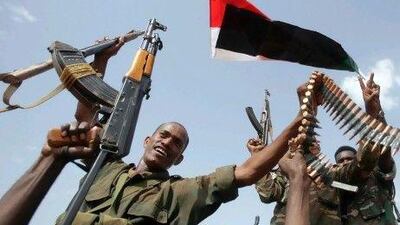NAIROBI // South Sudan's president said its northern neighbour has "declared war" on the world's newest nation, just hours after Sudanese jets dropped eight bombs onto South Sudan yesterday.
The president Salva Kiir's comments, made during a trip to China, signal a rise in rhetoric between the rival nations who had spent decades at war with each other. Neither side has officially declared war.
Sudan and South Sudan have been drawing closer to a full-scale conflict in recent weeks over the unresolved issues of oil revenues and their disputed border. The violence has drawn alarm and condemnation from the international community, including from the United States president Barack Obama.
South Sudan seceded from Sudan last year as a result of a 2005 peace treaty that ended decades of war that killed 2 million people.
The Sudan president Omar Al Bashir gave a fiery speech last week in which he said there will be no negotiations with the "poisonous insects" who are challenging Sudan's claim to disputed territory near the nations' shared border.
Mr Kiir, the southern president, arrived in China late Monday for a five-day visit to lobby for economic and diplomatic support. China's energy needs make it deeply vested in the future of the two Sudans, and Beijing is uniquely positioned to exert influence in the conflict given its deep trade ties to the resource-rich south and decades-long diplomatic ties with Sudan's government in the north.
Mr Kiir told the Chinese president Hu Jintao that his visit came at "a very critical moment for the Republic of South Sudan because our neighbour in Khartoum has declared war".
South Sudan's military spokesman Colonel Philip Aguer said that Sudanese jets dropped eight bombs overnight Monday in Panakuac, where he said there had been ground fighting earlier that day. Col Aguer said he could not offer a death toll from the attack because of a poor communication link with the remote area.
On Monday, Sudanese warplanes bombed a market and an oilfield in South Sudan, killing at least two people after Sudanese ground forces reportedly crossed into South Sudan with tanks and artillery.
Talks over oil revenue and the border broke down this month after attacks started between the two countries, with South Sudan invading the oil-rich border town of Heglig, which Sudan claims.
Following international pressure, South Sudan announced that it withdrew its troops from Heglig, but Sudan claimed its own troops had forced them out.
Mr Al Bashir, the Sudanese president, vowed to press ahead with his military campaign until all southern troops or affiliated forces are chased out of the north.
He also said he would never allow South Sudanese oil to pass through Sudan "even if they give us half the proceeds".
The landlocked South Sudan stopped pumping oil through Sudan in January, accusing the government in Sudan's capital, Khartoum, of stealing hundreds of millions of dollars of oil revenue. Sudan responded by bombing the South's oilfields.
The South Sudan government spokesman, Barnaba Marial Benjamin, said earlier this month that Chinese and American investors want to build oil refineries in the South in the next six to seven months.
Mr Benjamin said the refineries will help South Sudan process fuel for local consumption. South Sudan will also build a pipeline to the Kenyan coast and another to Djibouti through Ethiopia to be able to export its oil, he said. He said both projects were meant to make South Sudan independent of Sudan's fuel infrastructure and processing plants.
Mr Kiir yesterday told Mr Hu that he came to China because of the "great relationship" South Sudan has with China, calling it one of his country's "economic and strategic partners."
Both sides have tried to win Beijing's favour, but China has been careful to cultivate ties with each nation.
Like others in the international community, China has repeatedly urged the two sides to return to negotiations.

